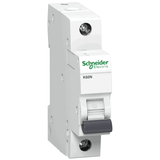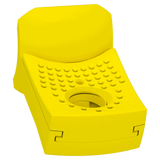
Miniature Circuit Breakers (MCB)
A miniature circuit breaker is an electromagnetic device that carries a complete molded insulating material. The primary function of this device is to switch the circuit. This means to automatically open the circuit (which has been connected to it) when the current passing through the circuit goes beyond a set value or limit. The device can be manually switched ON or OFF just like normal switches whenever necessary.
MCBs are time-delay tripping devices. In these devices, the operating time is controlled by the magnitude of overcurrent passing through it, which means that the device functions whenever there is an overload existing for long periods, long enough to endanger the circuit being protected. MCBs do not respond to transients such as motor starting currents or switch surges. Typically, these devices are designed to operate at less than 2.5 milliseconds when there are short circuit faults and between 2 seconds to 2 minutes in case of overloads.
A MCB (Miniature Circuit Breaker) is a type of electrical switch designed to protect electrical circuits from overcurrents and short circuits. It is a critical safety device used in residential, commercial, and industrial electrical distribution systems. MCBs are compact and can fit on standard DIN rails in distribution panels, making them easy to install and replace. MCBs are essential safety devices that prevent electrical circuits and equipment from damage due to excessive currents. They play a vital role in protecting against electrical hazards and ensuring the safe and reliable operation of electrical systems.
MCBs (Miniature Circuit Breakers) work based on a thermal-magnetic tripping mechanism. This combination allows MCBs to provide protection against both overloads and short circuits. Following describes how an MCB works in response to different fault conditions:
- Normal Operation (No Fault): Under normal operating conditions, the MCB allows the flow of electrical current through the circuit without any interruption. The internal spring-loaded contacts of the MCB remain in their closed position, completing the electrical circuit.
- Overload Condition: If the current flowing through the circuit exceeds the rated current of the MCB but not significantly higher, the thermal tripping mechanism comes into play. The MCB has a bimetallic strip inside it. As the current flows through the bimetallic strip, it heats up, causing it to bend. When the current exceeds the safe limit for a prolonged period, the bimetallic strip bends enough to release the latch mechanism. This action triggers the trip mechanism, and the MCB quickly opens, interrupting the current flow and protecting the circuit from damage due to excessive heat.
- Short Circuit Condition: In the event of a short circuit, where an extremely high current flows through the circuit in a very short duration, the magnetic tripping mechanism responds rapidly. A short circuit causes a rapid buildup of magnetic field strength around the conductor. This magnetic field induces a strong force on the magnetic coil inside the MCB. This force overcomes the mechanical spring holding the contacts closed, causing the MCB to trip almost instantaneously. The quick tripping action helps prevent damage to the circuit and equipment due to the high current surge.
- Resetting the MCB: After an overload or short circuit has been cleared and the fault condition is resolved, the MCB can be manually reset. To reset the MCB, the handle must be turned to the OFF position and then back to the ON position. This action re-engages the internal latch and resets the bimetallic strip and magnetic coil, allowing the MCB to be ready for normal operation once again.
It is important to select the appropriate MCB with the correct current rating and trip characteristics to match the electrical load and provide effective circuit protection. MCBs are critical safety devices that help prevent electrical hazards and protect electrical circuits and equipment from damage caused by excessive currents.
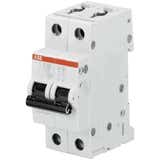 S202-C16 Miniature Circuit Breaker - 2P - C - 16 A
S202-C16 Miniature Circuit Breaker - 2P - C - 16 AABB
SKU: AB_2CDS252001R0164
Model: S202-C16
SGD $18.77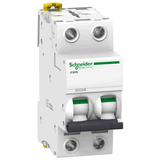 Miniature Circuit-breaker, Acti9 IC60N, 2P, 16 A, D Curve, 6000 A (IEC 60898-1), 10 KA (IEC 60947-2)
Miniature Circuit-breaker, Acti9 IC60N, 2P, 16 A, D Curve, 6000 A (IEC 60898-1), 10 KA (IEC 60947-2)Schneider
SKU: SE_A9F75216
Model: A9F75216
SGD $32.48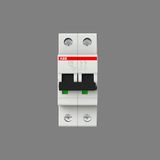 S202-C10 Miniature Circuit Breaker - 2P - C - 10 A
S202-C10 Miniature Circuit Breaker - 2P - C - 10 AABB
SKU: AB_2CDS252001R0104
Model: S202-C10
SGD $18.77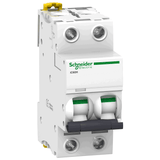 Miniature Circuit-breaker, Acti9 IC60H, 2P, 10 A, C Curve, 10000 A (IEC 60898-1), 15 KA (IEC 60947-2)
Miniature Circuit-breaker, Acti9 IC60H, 2P, 10 A, C Curve, 10000 A (IEC 60898-1), 15 KA (IEC 60947-2)Schneider
SKU: SE_A9F84210
Model: A9F84210
SGD $25.95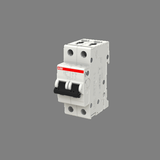 S202M-C6 Miniature Circuit Breaker - 2P - C - 6 A
S202M-C6 Miniature Circuit Breaker - 2P - C - 6 AABB
SKU: AB_2CDS272001R0064
Model: S202M-C6
SGD $20.59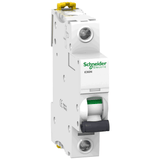 IC60N - Miniature Circuit Breaker - 1P - 20A - C Curve
IC60N - Miniature Circuit Breaker - 1P - 20A - C CurveSchneider
SKU: SE_A9F74120
Model: A9F74120
SGD $5.43 IC60N - Miniature Circuit Breaker - 2P - 10A - C Curve
IC60N - Miniature Circuit Breaker - 2P - 10A - C CurveSchneider
SKU: SE_A9F74210
Model: A9F74210
SGD $23.83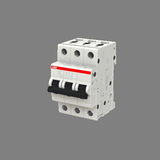 S203M-C16 Miniature Circuit Breaker - 3P - C - 16 A
S203M-C16 Miniature Circuit Breaker - 3P - C - 16 AABB
SKU: AB_2CDS273001R0164
Model: S203M-C16
SGD $33.18 Miniature Circuit-breaker, Acti9 IC60H, 2P, 10 A, B Curve, 10000 A (IEC 60898-1), 15 KA (IEC 60947-2)
Miniature Circuit-breaker, Acti9 IC60H, 2P, 10 A, B Curve, 10000 A (IEC 60898-1), 15 KA (IEC 60947-2)Schneider
SKU: SE_A9F83210
Model: A9F83210
SGD $25.95 Miniature Circuit-breaker, Acti9 IC60N, 2P, 10 A, D Curve, 6000 A (IEC 60898-1), 10 KA (IEC 60947-2)
Miniature Circuit-breaker, Acti9 IC60N, 2P, 10 A, D Curve, 6000 A (IEC 60898-1), 10 KA (IEC 60947-2)Schneider
SKU: SE_A9F75210
Model: A9F75210
SGD $32.48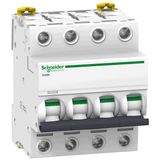 Miniature Circuit-breaker, Acti9 IC60H, 4P, 63 A, C Curve, 10000 A (IEC 60898-1), 15 KA (IEC 60947-2)
Miniature Circuit-breaker, Acti9 IC60H, 4P, 63 A, C Curve, 10000 A (IEC 60898-1), 15 KA (IEC 60947-2)Schneider
SKU: SE_A9F84463
Model: A9F84463
SGD $129.10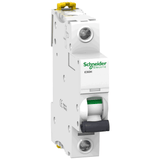 Miniature Circuit-breaker, Acti9 IC60H, 1P, 16 A, C Curve, 10000 A (IEC 60898-1), 15 KA (IEC 60947-2)
Miniature Circuit-breaker, Acti9 IC60H, 1P, 16 A, C Curve, 10000 A (IEC 60898-1), 15 KA (IEC 60947-2)Schneider
SKU: SE_A9F84116
Model: A9F84116
SGD $8.31 IC60N - Miniature Circuit Breaker - 2P - 6A - C Curve
IC60N - Miniature Circuit Breaker - 2P - 6A - C CurveSchneider
SKU: SE_A9F74206
Model: A9F74206
SGD $23.83 IC60N - Miniature Circuit Breaker - 1P - 10A - C Curve
IC60N - Miniature Circuit Breaker - 1P - 10A - C CurveSchneider
SKU: SE_A9F74110
Model: A9F74110
SGD $5.43 IC60N - Miniature Circuit Breaker - 1P - 16A - C Curve
IC60N - Miniature Circuit Breaker - 1P - 16A - C CurveSchneider
SKU: SE_A9F74116
Model: A9F74116
SGD $5.43 Miniature Circuit-breaker, Acti9 IC60N, 1P, 10 A, B Curve, 6000 A (IEC 60898-1), 10 KA (IEC 60947-2)
Miniature Circuit-breaker, Acti9 IC60N, 1P, 10 A, B Curve, 6000 A (IEC 60898-1), 10 KA (IEC 60947-2)Schneider
SKU: SE_A9F73110
Model: A9F73110
SGD $5.43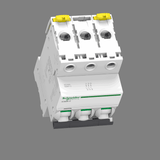 IC60N - Miniature Circuit Breaker - 3P - 63A - C Curve
IC60N - Miniature Circuit Breaker - 3P - 63A - C CurveSchneider
SKU: SE_A9F74363
Model: A9F74363
SGD $60.57 Miniature Circuit-breaker, Acti9 IC60H, 2P, 16 A, C Curve, 10000 A (IEC 60898-1), 15 KA (IEC 60947-2)
Miniature Circuit-breaker, Acti9 IC60H, 2P, 16 A, C Curve, 10000 A (IEC 60898-1), 15 KA (IEC 60947-2)Schneider
SKU: SE_A9F84216
Model: A9F84216
SGD $25.95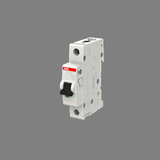 S201M-C6 Miniature Circuit Breaker - 1P - C - 6 A
S201M-C6 Miniature Circuit Breaker - 1P - C - 6 AABB
SKU: AB_2CDS271001R0064
Model: S201M-C6
SGD $7.15 Miniature Circuit-breaker, Acti9 IC60N, 2P, 6 A, B Curve, 6000 A (IEC 60898-1), 10 KA (IEC 60947-2)
Miniature Circuit-breaker, Acti9 IC60N, 2P, 6 A, B Curve, 6000 A (IEC 60898-1), 10 KA (IEC 60947-2)Schneider
SKU: SE_A9F73206
Model: A9F73206
SGD $23.83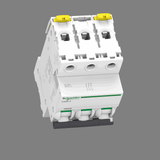 IC60N - Miniature Circuit Breaker - 3P - 16A - C Curve
IC60N - Miniature Circuit Breaker - 3P - 16A - C CurveSchneider
SKU: SE_A9F74316
Model: A9F74316
SGD $36.06 IC60N - Miniature Circuit Breaker - 2P - 16A - C Curve
IC60N - Miniature Circuit Breaker - 2P - 16A - C CurveSchneider
SKU: SE_A9F74216
Model: A9F74216
SGD $23.83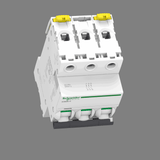 IC60N - Miniature Circuit Breaker - 3P - 6A - C Curve
IC60N - Miniature Circuit Breaker - 3P - 6A - C CurveSchneider
SKU: SE_A9F74306
Model: A9F74306
SGD $36.06 Miniature Circuit-breaker, Acti9 IC60H, 2P, 6 A, B Curve, 10000 A (IEC 60898-1), 15 KA (IEC 60947-2)
Miniature Circuit-breaker, Acti9 IC60H, 2P, 6 A, B Curve, 10000 A (IEC 60898-1), 15 KA (IEC 60947-2)Schneider
SKU: SE_A9F83206
Model: A9F83206
SGD $25.95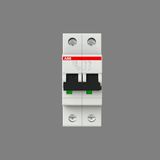 S202-C32 Miniature Circuit Breaker - 2P - C - 32 A
S202-C32 Miniature Circuit Breaker - 2P - C - 32 AABB
SKU: AB_2CDS252001R0324
Model: S202-C32
SGD $19.50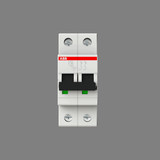 S202-C20 Miniature Circuit Breaker - 2P - C - 20 A
S202-C20 Miniature Circuit Breaker - 2P - C - 20 AABB
SKU: AB_2CDS252001R0204
Model: S202-C20
SGD $18.77 Miniature Circuit-breaker, Acti9 IC60N, 2P, 6 A, D Curve, 6000 A (IEC 60898-1), 10 KA (IEC 60947-2)
Miniature Circuit-breaker, Acti9 IC60N, 2P, 6 A, D Curve, 6000 A (IEC 60898-1), 10 KA (IEC 60947-2)Schneider
SKU: SE_A9F75206
Model: A9F75206
SGD $32.48 Miniature Circuit-breaker, Acti9 IC60H, 2P, 16 A, B Curve, 10000 A (IEC 60898-1), 15 KA (IEC 60947-2)
Miniature Circuit-breaker, Acti9 IC60H, 2P, 16 A, B Curve, 10000 A (IEC 60898-1), 15 KA (IEC 60947-2)Schneider
SKU: SE_A9F83216
Model: A9F83216
SGD $25.95
